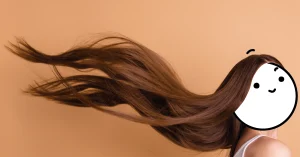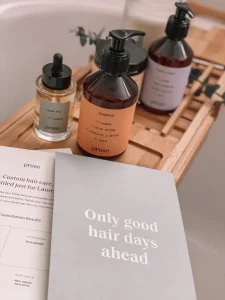Ah, the winter season, when the world dons a shimmering frost-covered cloak and our hair serves as a receptive canvas for the seasonal artistry. Winter hair care is a topic close to my heart, so as I watch snowflakes dance delicately outside the window while drinking a cup of steaming cocoa, I start thinking about it.
This isn’t just a blog, my dear readers; it’s a journey through the enchanted forests of winter hair care, where each strand carries a tale and each snowflake conceals a secret. Grab a warm blanket and a fragrant candle, and join me as we set out on a personal odyssey to discover the secrets of caring for our hair in the icy grip of winter.
Our hair frequently takes the brunt of the whims of winter as the world dons its icy cloak. Our once-shiny locks may become unruly and parched during the season of roaring fires and warm scarves. But have no fear—you still have time to adopt a hair care routine that will keep your mane radiant all winter long. It’s all within the grasp of winter’s chill. In this enchanted tour of winter hair care, we’ll reveal the techniques for protecting your tresses from the worst weather.
Imagine going out for a meeting with dry and flaky hair. Fixing your hair after every 5 minutes would definitely not make the texture any better. It would ruin the boss-woman attitude in the middle of the meeting as well and will result in delivering a bad presentation. Don’t worry, Litgleam has got you!
Let’s start with the myths, shall we? The most common one that every person on this planet blames for damaged hair is “heredity”. No! This is not true. You need to start putting in the effort to get results.
Consistency is the key to long, healthy and lustrous hair. You have to put in the work to get the healthiest hair that you have always dreamed of having.
Okay, enough with the motivational speech. Now, let’s get into how you can get your dream hair.
Drink plenty of water:
Imagine your hair as a thirsty traveller in the arid wintertime atmosphere. Invest in a luxurious, hydrating shampoo and conditioner to quench its thirst. Look for products that have argan oil, shea butter, or hyaluronic acid added for added moisture. These ingredients are the liquid gold of hair care. Your hair will appreciate the extra moisture you give it.
Don’t Overwash:
It’s like sending your hair on an oil-stripping expedition if you wash it too frequently in the winter. Limit the weekly washings of your hair to two or three. Use a little dry shampoo on days when you don’t wash your hair to keep it looking clean and fresh without overdrying it.
Warm Water, Not Hot:
Your hair prefers a warm, comfortable environment, even though hot showers are wonderful. Hot water can be a hair’s worst enemy because it removes natural oils more quickly than a thief in the middle of the night. Therefore, choose lukewarm water to keep your hair lush.
Deep conditioning procedures:
Enjoy a weekly spa day with a deep conditioning treatment for your hair. Either use store-bought masks to pamper it or create your own concoction using yogurt, honey, avocado, or other ingredients. These enchanted potions will hydrate the skin and treat any wounds from combat.
Guard against the Elements:
Winter’s chilly winds and icy spells can be an obnoxious foe. To protect your hair from the elements, arm yourself with a chic hat or a soft scarf. However, avoid wearing hats that are too tight because this could cause your hair’s spirit to be broken by friction.
Trim Frequently:
Regular trims every 6 to 8 weeks will show your hair the love it needs. Split ends are gone, and your hair will now be healthier and more vibrant.
Utilize a humidifier:
The use of indoor heating systems can make your house feel like a desert. Your skin and hair will both appreciate it if you install a humidifier in your bedroom to add moisture to the air.
Reduce Heat Styling: Give your hair a break from the hot pursuit of styling tools in the name of self-love. Accept your inherent beauty and experiment with heatless styling techniques. Be the responsible owner and equip yourself with a heat protectant spray if you must use heat.
Maintain Proper Hydration and Diet:
Your hair will look its best if you drink enough water and eat a healthy diet. Drink plenty of water and indulge in foods high in omega-3s, such as salmon and avocados. Your gratitude will make your hair glow.
10. Consistent Oil Treatments
Add some extra tender loving care to your hair with nourishing oils like coconut or jojoba. Before washing your hair, let them work their magic for a few hours or overnight. Oil is your best friend. Stop relying on other people to be your friend when oil can actually give you what you have been asking for from all of your toxic friends. Sorry for stating facts, but it is true. Let’s not distract ourselves from the topic and push the nerve that hurts the most.
WINTER HAIR WOES
To effectively combat these winter hair problems, you must first understand them. Even in the coldest of seasons, we can maintain our hair’s best appearance and feel with the proper care and attention.
The problems of winter-damaged hair, ah! To our dismay, our once-lustrous locks set off on an errant journey as the chilly winds weave their frosty tapestries.
Imagine your hair has been painstakingly styled, but the moment you step outside into the winter wonderland, it rebels! Your sleek mane becomes an untamed forest of frizz due to the dryness of the air. It resembles Mother Nature’s own naughty artwork.
Static Electricity: Your hair develops static electricity as a result of the winter’s dry, parchment-like air. Your crowning achievement abruptly changes into a spark conductor, giving you the dreaded “static shock” expression. Unsettling, isn’t it?
Split Ends: Ah, those sneaky hair traitors, the split ends! With those frayed tips, they silently announce their presence as they enter covertly. They not only look bad, but they also open the door for more harm. The battle is genuine.
Dullness: The harsh weather and dry conditions of winter work together to rob your hair of its natural shine. Not only are they unsightly, but they also act as a gateway for further damage. The struggle is real.
Hair that has been damaged by winter becomes brittle, like delicate glass. Every comb pull, every gust of icy wind, threatens to break it. The frustration of growing out your hair is palpable, and it suddenly feels like navigating a dangerous path.
But don’t worry; this winter, armed with knowledge and a little pampering, we will overcome these nerve-wracking difficulties. We’ll share tips on how to take care of your hair in the icy grip of the season as a group.
All these tactics are for you to prevent your hair from the dryness that winter causes, but Litgleam has a secret that will open a new gate of possibilities for the growth of your hair. This is not just for winters, but for all the seasons that you can possibly think of. You can even make one yourself if you want. It is a secret herb that enhances your dishes. Who would have thought that it would help with accessive hair growth if used the right way? Still thinking about which herb we are talking about? It is rosemary. Hold on! Let us explain the benefits of using rosemary on your hair.
Rosemary essential oil has a remarkable capacity to improve blood flow to the scalp, which is a circulation booster. Rosemary oil acts as a vasodilator in the winter, when blood vessels tend to constrict due to the cold, ensuring that essential nutrients reach your hair follicles and encouraging healthier and faster hair growth.
Strengthens Hair: The abrasive winter weather can weaken your hair, increasing the likelihood of breakage. Antioxidants in rosemary strengthen hair and lessen the chance of winter-related hair damage.
Dandruff treatment: Dry, flaky scalp problems frequently get worse in the winter. Because of its inherent antifungal properties, rosemary helps prevent flakiness and dandruff, laying the groundwork for healthy hair growth.
Hair Thickness: By stimulating the hair follicles, rosemary promotes the development of thicker, fuller strands of hair.
Rosemary stimulates the growth of thicker, fuller strands of hair by stimulating the hair follicles. This is especially helpful during the colder months when your hair may feel limp and lifeless.
Retention of Moisture: Rosemary oil aids in retaining moisture, preventing the drying that frequently afflicts hair in the winter. It functions as a natural conditioner, keeping the hydration and vitality of your hair.
Stress management: Stress and the wintertime blues can be bad for your hair. The calming scent of rosemary can aid in reducing stress, which in turn promotes healthy hair growth.
Hair shine: Maintaining a good appearance is just as important as hair growth! Rosemary gives your hair a natural shine that defies the gloomy appearance that winter is known for.
You can use an alternative method for applying rosemary to your hair too. Just boil some rosemary and leave in water for 5 minutes. Let the temperature come down. Transfer the water to a spray bottle and spray it on your scalp every night. That will help you with your hair growth just as much as rosemary essential oil would.
Now picture how wonderful it would be to spend a chilly winter night curled up in a warm blanket while your hair enjoys the restorative benefits of rosemary-infused hair care. It’s the ideal treatment for a winter mane that not only endures but actually benefits from the cold.
Embrace winter hair care to keep your locks healthy. Hydrate with quality products, limit washing, and use lukewarm water. Deep condition weekly and shield hair from the elements. Get regular trims, add humidity, and reduce heat styling. Rosemary oil promotes growth. Winter can’t dull your shine!





